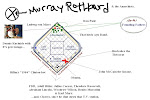
We did our business on a State-owned pier that sat right smack in the middle of public waters that separated the landfills of Staten Island from lovely Bayridge, Brooklyn. The pier was a Veteran's Memorial and was adjacent to a botanical garden and the Belt Parkway. There was also a giant pole-like structure within a Jewish star of David that was erected in honor of September 11th, 2001. I should also mention the view. I could see the rather miniscule Statue of Liberty, an armada of oil tankers, cargo ships, yachts, sailboats and speed boats, the publically-owned Verrazano Bridge, Goldman Sachs in Jersey City, the tippy-tops of the Empire State Building, parts of the Brooklyn Bridge and all of the Battery & the Lower East Side (Wall Street). Suffice to say, the view was panoramic and breath-taking.

"Goldman Sachs is gigantic relative to Liberty. Literally."
Fishing was fun. It was. However, being it was somewhat inefficient and I noticed a couple of things:
*My friend Syed, kept catching nice flukes. He had to throw them back because they were "out-of-season", and so cops were patrolling the area with a natural tendency to ticket and fine. Why would you throw back into the water, fish, potential food that was edible, caught with merit and skill? I understood that there are issues about scarcity, and that this is the only to ensure that none of these fish are hunted into extinction, but that lead to the the next point.
*Okay, there's the animal rights argument, the fish have a right to not be overhunted and what not. That's pure crass. Fish are products, and nothing more. If we have people fishing, its implied that this is meant to be a marine holocaust for fish, and tasty meals for all of us. (I have a decisive article coming out next week on this matter where I treat the ethical framework for animal rights.)
*Why are these fish even allowed to be hunted then? The truth is, the dilemma is that its a public resource, and everyone and no one own the fish. No one has homesteaded the fish, therefore no one actually rations these goods efficiently or applies any serious economic calculation to the "resources" at hands. None of these people or the government technically own the water in the riverbed either, so no one can be excluded from consuming the resources, and no one can homestead the pier and start up a business either, because its owned by the "State". There is no way to limit the consumption of fishers. I also noted that it was not equitable, because you had four or five fisherman monopolizing the premier spots of the pier for most of the day, catching yellow-spotted bass and foot long trout and even small sharks, and everyone is limited to the lesser spots. These fisherman "homesteaded" this public property, which is ironic, because no one, except a public official can push them off it. (Although this brings up a more puzzling twist. Our taxes are funneled into a system that is the local state that provides such facilities like these piers. Don't we then by logical derivative, have some right to ownership?)
*There is no economic reasoning here: no law and supply and demand to constrain the amount of resources that are consumed and stockpiled, more importantly, there is no price mechanism. If there was price on how shallow the water was, where the rarer fish are, or where they are more abundant, you will preserve fish, because you will weed out and limit demand. Its simple, as the opportunity cost rises to catch fish, the more you will restrict demand, and increase supply. More so, because everything is publically held, there are resources being foregone, facilities aren't being maintained, and its for this fundamental reason, that you have enacted so many "out-of-season" policies. It isn't because of the greedy, animalistic impulses of fishers. It's because you don't have an owner that can effectively allocate resources efficiently. This is exactly what happens in public lakes, and other public parks, public lands, etc. You have animals going extinct because of overhunting, plants dying out, and the property is abused and neglected by campers and hitch-hikers since no one is there to take care of it.
*Why is this? Well it's because the government owns the pier, the fish and well, no one owns the water. Since none of these conditions provide the premsies for private ownership, that means noone actually owns anything. It's a free for all, and hence we have a tragedy of the commons!
The answer: Private property.
Sell off these ridiculous public facilities if you want an authentic injection of stimulus into the private economy, and put them to their most efficient use. Think of the innumerable jobs and profits that are being foregone by having so many actual idle resources be used so inefficiently? This could very easily be made into a very well run business operation. I noticed that there were no food stands or advertisements all afternoon, and it was steaming hot. I know that the opportunity cost of leaving my fishing rod is me foregoing a potential fish for later to buy an ice cold bottle of Poland Spring were not as high were a vendor on the pier selling slightly higher prices than the local bodega five blocks away. Were this pier privately owned, you know that this would be just one way to finance a business. I thought up a number of ways that profit could be made, and I'm not even an entrepreneur.
Prices are the road to prosperity.




